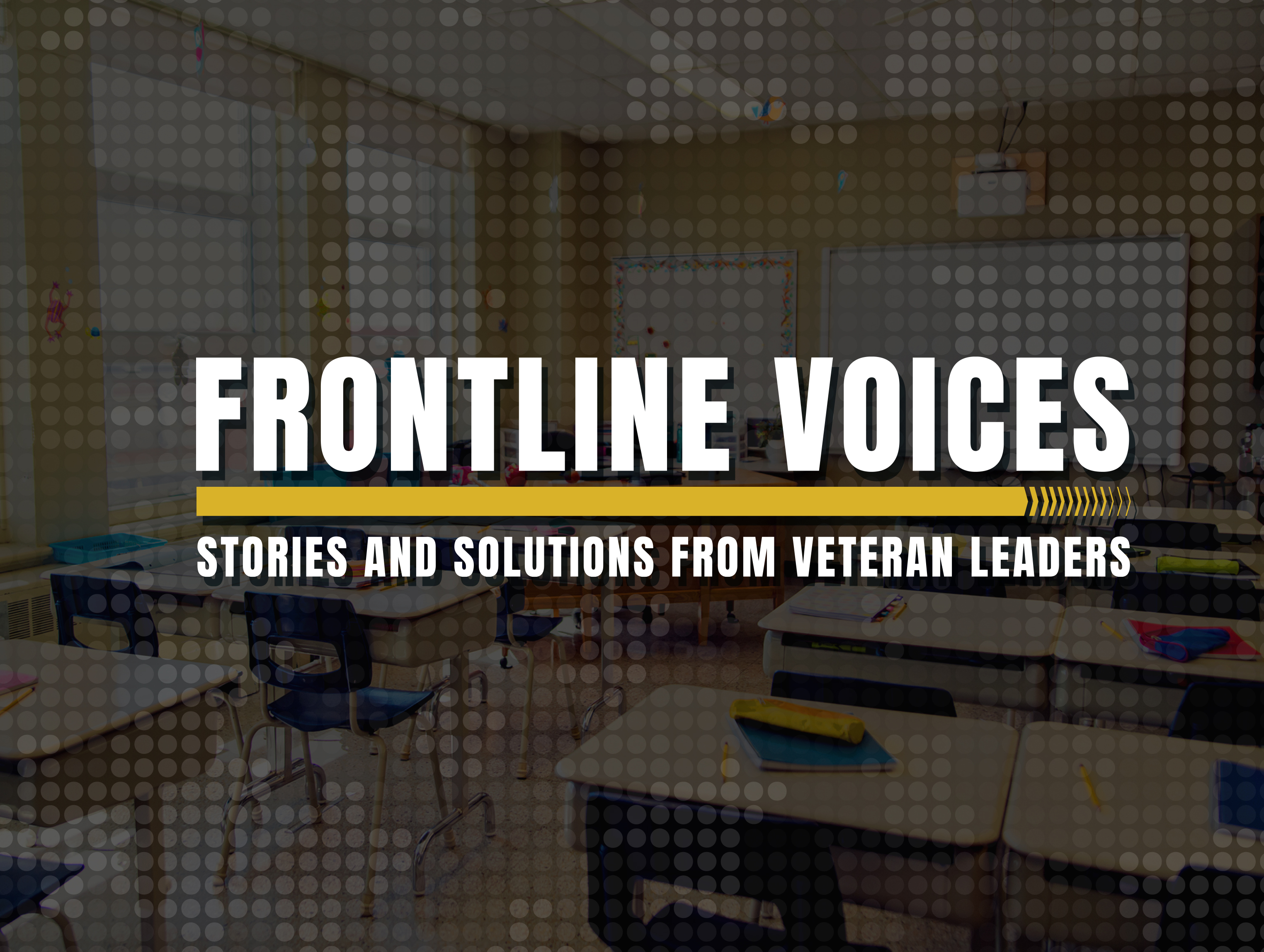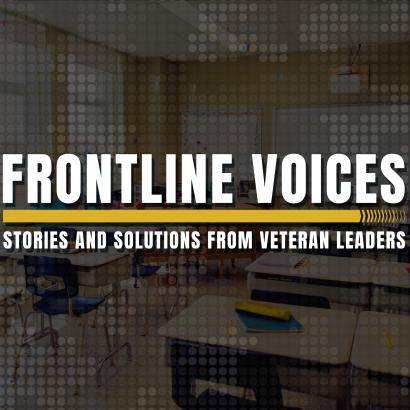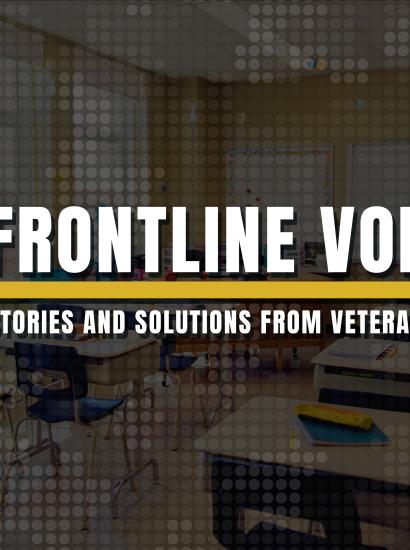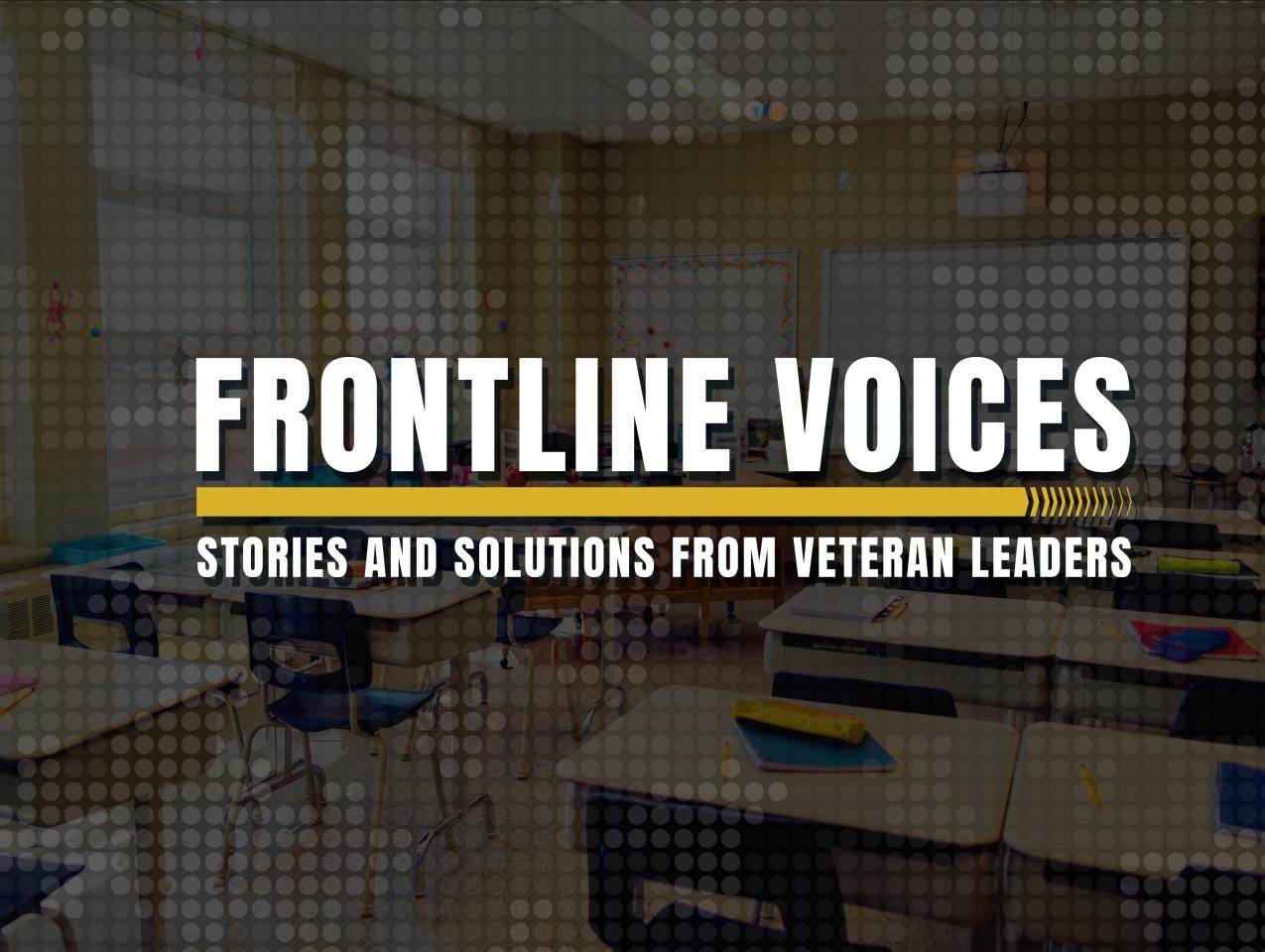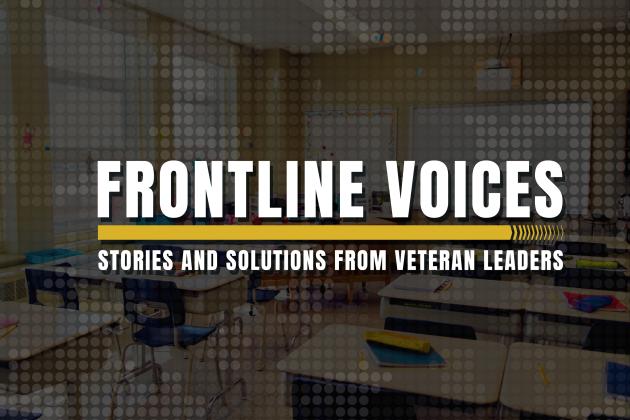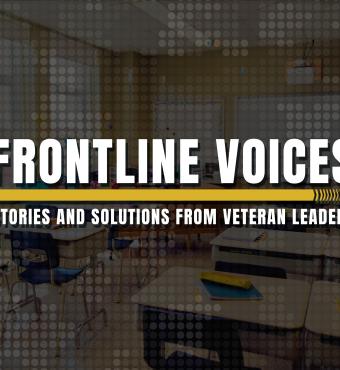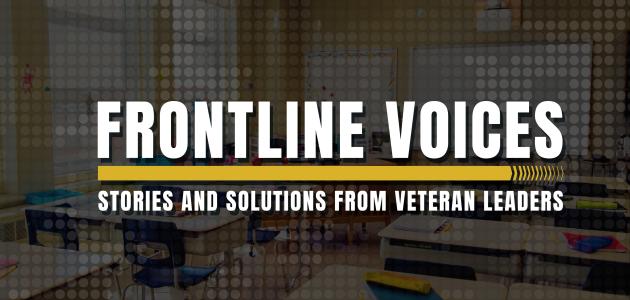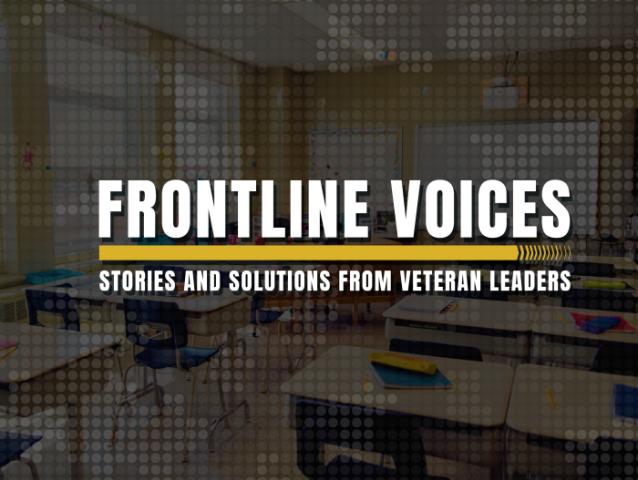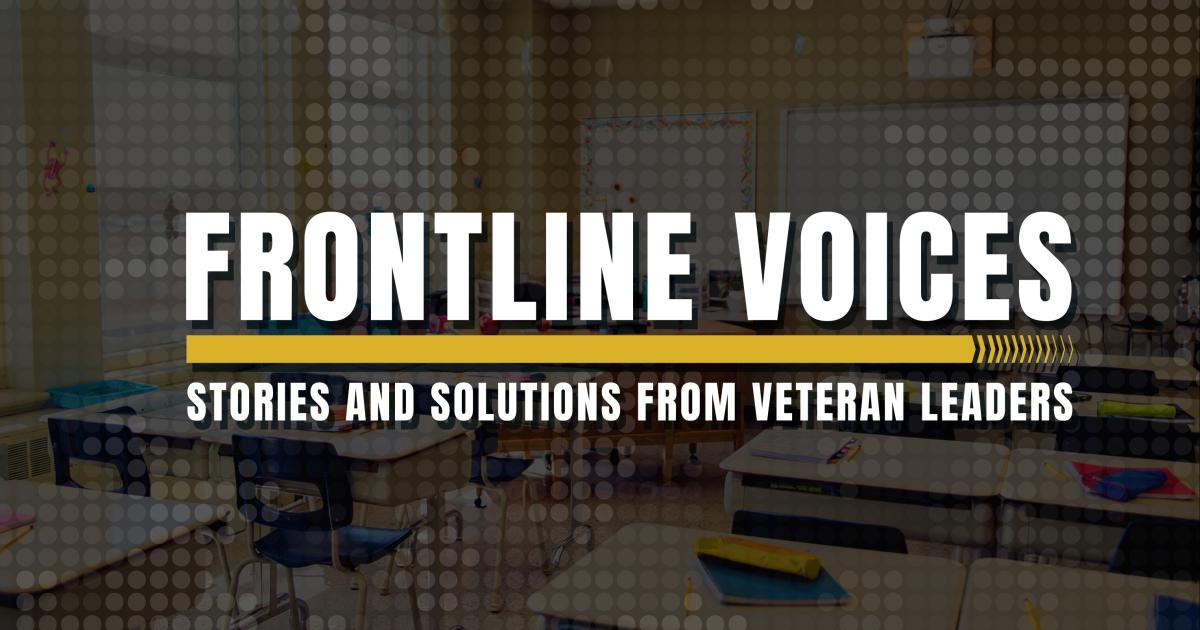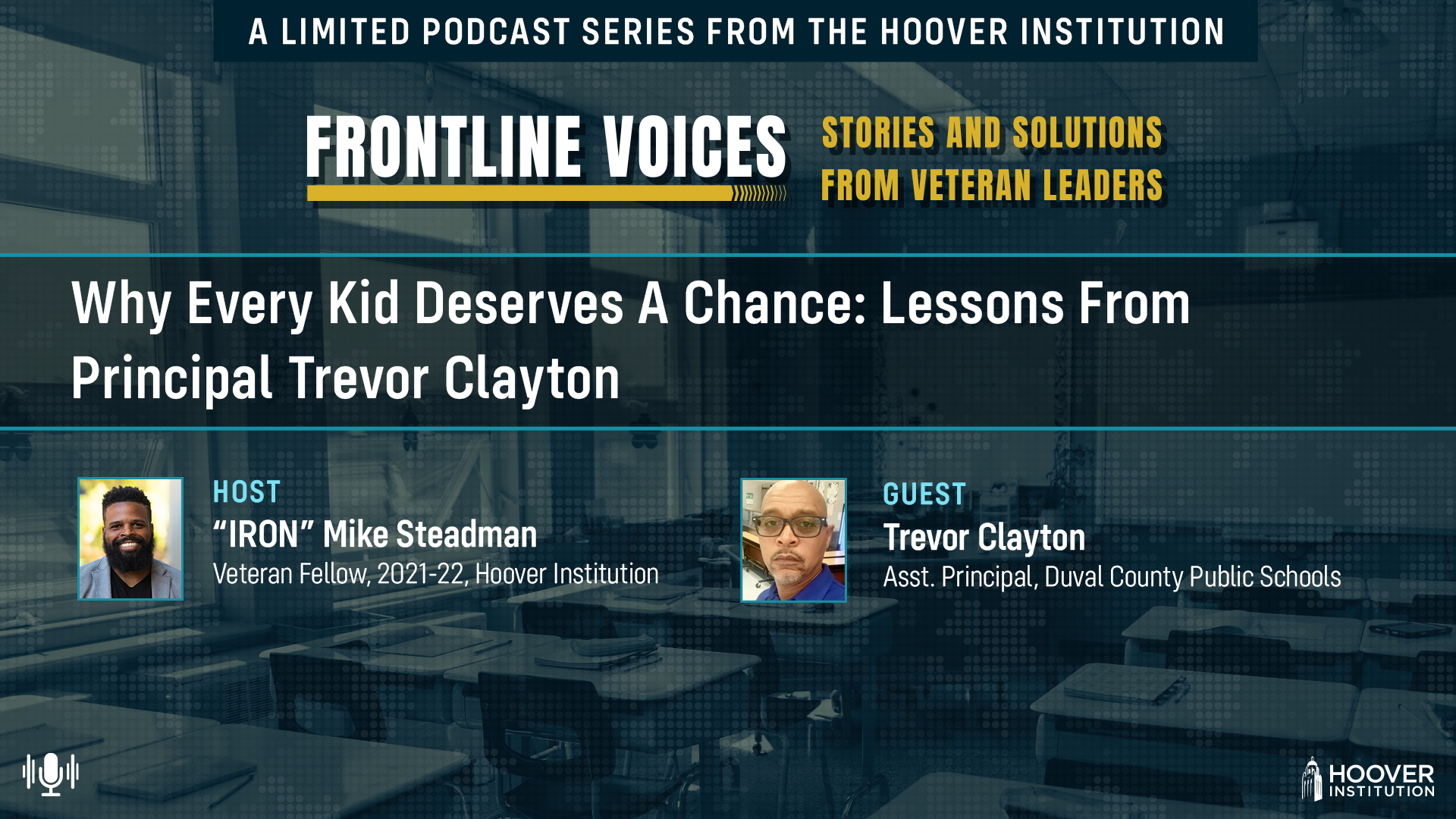- Education
- Reforming K-12 Education
In this powerful episode, Navy veteran and middle school principal Trevor Clayton joins Frontline Voices to share how his military service prepared him for the battle to transform public education. Trevor opens up about his childhood influences, the moment he knew he wanted to teach, and the challenges students face in Title I schools. From celebrating small wins to fighting harmful labels, Trevor breaks down how he and his team instill confidence and excellence, one student at a time. This episode is a reminder that veterans still have battles worth fighting—this time, for our kids.
Recorded on April 9, 2025.
WATCH THE VIDEO
>> IRON Mike Steadman: Welcome to Frontline Voices podcast, brought to you by Stanford University's Hoover Institution, where we explore leadership, service, and real world solutions to some of our nation's most pressing issues. I'm your host, IRON Mike Steadman, a member of the inaugural class of Hoover veteran fellows and a Marine Corps veteran.
In today's episode, we turn our attention to one of the most underappreciated battlefields in America, our public school system. Joining me is Trevor Clayton, a Navy veteran turned middle school principal who spent the last decade on the front lines of public education. His mission? To rebuild confidence in students, challenging low expectations and reminding communities of what's possible when we invest in our kids.
On the show, Trevor and I talk about what it takes to build confidence in students who've never been told they're smart, how to cut through the noise of low expectations and labels, and why celebrating small wins can radically change school culture. What struck me the most about this conversation with Trevor isn't just his commitment to academic excellence, but how he connects the dots between military leadership, mentorship, and education innovation.
From hunger in the classroom to better leveraging technology, Trevor paints a vivid picture of the challenges and opportunities facing our public schools today. As always, I hope you enjoy today's show and look forward to hearing your feedback. Mr. Clayton, thank you for joining us on Frontline Voices. How are you doing sir?
>> Trevor Clayton: Good evening. How are you, Mike?
>> IRON Mike Steadman: I have to say, I have to say you're looking very sharp. It's a pleasure having you on because we're going to be talking about a topic that I think is very near and dear to a lot of our listeners hearts, which is public education and education in general.
And with you being on the front lines in the trenches, in the middle school, you know, we're really in for a treat today and I appreciate you making time to come on the show and share your insights with our audience.
>> Trevor Clayton: Thank you. Thank you for having me.
>> IRON Mike Steadman: I think let's go ahead and begin by just kind of having you go ahead and introduce yourself, your military background and how you ended up in education in the first place.
>> Trevor Clayton: Okay. I'm Trevor Clayton. I grew up in kind of two places. I grew up with my mom, some in New York City and with my maternal grandparents in New Orleans, Louisiana.
I joined the military at 18 school because I really didn't know what I wanted to do and gave me a way to or gave me a time space to figure out what I wanted to do with my young life. When I say the first year in I made this, I, I loved It.
I love the Navy. I love traveling. I love meeting a lot of diverse people from all over our nation, people that I would have never gotten a chance to meet and build relationships with some still today if I wouldn't have joined the Navy. So I did my first, maybe eight years as an enlisted person, went to college and got my.
Got a degree and got commissioned and was a engineering officer toward the second part of my career working with the guys in the engine spaces and fixing things and breaking things and just getting dirty. And even in that hot, tight space, building even stronger relationships. But going back to how I got into education in public education, which is ironic because I never went to public school.
I've always went to Catholic school my whole life. But in Catholic school, I had one male teacher named Mr Evans in the eighth grade. He was my eighth grade algebra teacher. And Mr. Evans was everything that I would like to be when I was older. He was smart, he was funny, he was sarcastic, he dressed well.
He was, you know, he was well groomed. And I, you know, he just made such an impression on me at, you know, 13 years old, 12, 13, I was in eighth grade, that I held on to the dream. I said, you know, if I ever got a chance to get into education, I would just because of him and what he meant to me and some of the other young men in my class.
And if I could only be that to some other young men, then I felt that my life would be beneficial and others could learn from it.
>> IRON Mike Steadman: That's amazing. You know, I come from a family of public educators. My mom was director of special education at a couple of different schools down in Texas.
My sister teaches in the high school level. She's speech and debate, communications, some other things. So I definitely grew up in that environment, you know, going to mom's office inside the, you know, at the school and everything. And I think it's real impactful, especially today, to have leaders of character, people of strong values inside the classroom, inside the school building, because, to be quite frank, right, you know, as I'm older now and I'm having these conversations with my fiance, like, we don't have any kids yet, but she's very adamant about sending kids to private school.
You know, you start having those real conversations. And for me, right, you can take it very personal because it almost makes it seem like, well, why are we not enough? You know, I came out of the public education system, but I think the world has just changed so rapidly.
And there are a lot of challenges in terms of, you know, we got social media now it's 247 resources and funding and when people on the outside looking in, you know, it can be very intimidating to want to send a child in some of these environments and.
>> Trevor Clayton: It is very intimidating because sometimes in the media and in the press all we see or all we are given is the horrors or some of the things that negatively happen in public schools.
But these same things are happening in private schools and charter schools every day. Public education is one thing that is a constitutional up until 12th grade everyone can't afford to send their children to an elite private school. Charter schools appeal to some and may not appeal to others.
And make no mistake, I am pro choice when it comes to education. I believe as a parent you should have choices and I also believe how we in public education fit into that choice is to give our families and our students. Something that we, they would want. Just like going to the grocery store.
>> IRON Mike Steadman: Right.
>> Trevor Clayton: Why are we choosing one brand over another? Sometimes it's because that's all we've used, but sometimes there's a product that really actually is better and works better and, and, and, and has the resources. I'm talking about public school to, to educate the whole child. You know, one thing I tell my teachers every day, especially when they're dealing with a difficult situation with a child, I tell them and I remind them, parents put their best kid on the bus every morning.
Okay? It's not like they put a bad kid on the bus and keep their good kid at home. Every morning they send us their best kid no matter what that is. And we have a duty in the public school system to educate them wholly to make sure that when they leave our building every day that their learning objective in each core class has been met.
And if we assess that it hasn't been met, how are we going to remediate those things that have not been met? And, and we do a, don't get me wrong, public schools in itself have an elitist, have an elite ranking. You have these magnet schools now even which my sons went to.
I didn't know a lot about magnet schools because I was in the Navy at the time because I was, you know, I wasn't in education, but they went to magnet schools and sometimes and, and like here the magnet schools are fantastic. But everybody can't go to a magnet school.
Everybody can't. Everybody doesn't have a magnet talent. You know, art or singing or Kids don't have that. So what we have to do in public education, we have to make the school up the street. The best school that we can make it for our families and children.
>> IRON Mike Steadman: When I was growing up, you know, people see me now, Naval Academy graduate, had a chance to go get my master's at Rutgers Newark, you know, hosting this podcast for the Hoover Institution.
But this is a drastically different world that I started out in.
>> Trevor Clayton: Right.
>> IRON Mike Steadman: Single parent home, really was not the most academically gifted kid. Never really got recognized for it. You know, and the shift for me was once I decided I want to go to the Naval Academy around my sophomore year of high school.
And so at that point, you know, and because my mom worked at the school, she had an opportunity to start getting me in some of those more advanced classes like ap, et cetera. And I just remember how different those classes were, especially with me being one of one in the room compared to the other classes.
That I was a part of.
>> Trevor Clayton: Yes.
>> IRON Mike Steadman: And to be truly honest, I did not academically, on paper, meet the criteria to be in those classes. But my mom was like, that's my baby. He wants to go to college. He wants to go to the Naval Academy.
And she made it happen. She had a little cloud at the school. When I was taking the SAT to go to the academy, I take the SAT six times, right? And there was an advanced program at the school.
>> Trevor Clayton: I'm glad you stuck with it.
>> IRON Mike Steadman: Yeah. To put us through that, you know?
And so these are kind of experiences that I had growing up, and I'm still trying to understand context now. Like, another thing I didn't realize was I used to always be jealous that I had to pay for lunch and breakfast. I felt like all these kids, they didn't have to pay.
They just go up to the counter and get their food. And every day I have to come in there with $2. It wasn't until I got older that I realized what reduced lunch really meant and how many kids these schools actually serve as more than just education to them.
It's like their place to get fed. And this came up during the pandemic.
>> Trevor Clayton: Right. Let me address the second half of what you talked about first, and then I'll go back to what you mentioned about your mom and in school and maybe being in classes that you didn't qualify for.
I've been in what we call in Florida Title 1 schools for about 10 years. And when we talk about Title 1, we talk about the lower socioeconomic families or neighborhoods, and we talk about the. The. We're talking about the percentage of free and reduced lunch. At the last 1, 2, 3.
My last four schools I've been administrator in, I feed kids breakfast, lunch, and sometimes dinner. And I know that for some children, this is the only. These are the only meals they get. And it's important. I cannot. We cannot teach a hungry child, you know, and it. It.
And it's not just and hunger. What I've learned being feeding kids every day is hunger has no skin color. Hunger has no zip code. Hunger transcends all those things. One thing I created in my first title one school, what's worked out for me, I. In school, in the lunchroom, we have a share table.
And our share table is, say you go through the lunch line and, or the breakfast line, and you're gonna watch a cinnamon toast crunch. We have a shared table in the back. And nothing. If you don't want it, we're not throwing it away. And the kids know apples go with apples, cereal goes with cereal, chocolate milk goes with chocolate milk.
And they put it on a share table. And every day I have kids that will come in and go back to the share table two or three times to get fed, and that's okay. And nobody makes fun of them. Nobody says anything. So we don't know how blessed we are that we can bring $2, like you said, and pay for lunch or like I did in private school, you know, I had last night's dinner in the lunchbox, you know, and some things.
So that's very important. Going back to your first part. You. Were one of the lucky ones that knew what you wanted to do. You wanted to go to the Naval Academy, and you had a plan. And not only that, not only did you have a plan, the Naval Academy, in a lot of ways, gave you a blueprint to work your plan.
You need this, this, and this, you know, to get there. And you would, not only do you need this, this, and this, you need a certain level of this, this, and this to get there. So you had a. You had a plan and. And then you had will because you were like you said, you were in classes that maybe you traditionally were not a part of, or maybe that academically, when it came to assessments, you did not qualify for.
But by the grace of God, your mom found a way to get you in there and provide you with the resources and the support for you to be successful. And that's good. A lot of the students that I serve. Do not have that support. So I become this.
I become that advocate. You know, I become, okay, how. How can we get more 8th grade kids into algebra? Because in the. That's the only way in, In Duval county, one of the only ways to get to the Madden schools is you have to have algebra in eighth grade.
Okay? So the magnet high schools, so you have to have algebra in 8th grade. So how can I get more kids? I've always. And I'm always thinking, how can I get more kids in algebra by the eighth grade so they can have an opportunity to go to a better high school if they wanted to, so they can have an opportunity to go to college?
So it starts very young. And what I do, I start with those kids at sixth grade. I can't regulate who comes to the school. I don't know what fifth graders are coming and how their scores are. I mean, I do, I get their data, but I don't know.
I don't know their background. So I have to work with them yet. We identify them, and then we work with them throughout instructional time through tier two, sometimes tier three interventions, mean a group of kids or individual kids, and to strengthen those skills, the math skills, the reading skills, because a lot of times the higher math, the real world situations are word problems.
So they have to be able to read and understand what the word problem is asking them. So we work on those critical thinking skills as soon as we get them. So when they take that assessment in the 7th grade, we can fill those seats for Algebra 1 in the 8th grade.
And it's not just about teaching them or having them be in algebra, but it's about giving them opportunities. Six years, eight years down the line.
>> IRON Mike Steadman: These kids you mentioned, you know, in the Title 1 schools. Right. Low socioeconomic status. We know the kind of psychological challenges that brings.
How do you instill confidence in kids like that when they're up against it academically? Because that's something. I'll be honest. I am 38 years old. I'm almost 38. I turned 38 by the time this podcast comes out. I grew up not thinking I was smart.
>> Trevor Clayton: Right, Right.
Most of us, unfortunately, I had the same similar situation. I grew up single parent, you know, in, you know, you know, going through, you know, just going through the, the ebbs and flows of being a young man with a single parent, trying to figure out what, what you want to do the biggest thing, a lot of those, A lot of children are confident, but they're confident about different things, you know, and we have to shift the confidence because some of them have never been successful in school.
You know, they've been successful at cheerleading, they've been successful at football, they've been successful at basketball, they've been successful at other things, but they've never been successful in school. So basically, how do they say in the streets, keep that same energy. I want them that same energy in the classroom, and not give up.
If you can practice in the summer, three, four hours in the heat of Florida to become a better running back or receiver or quarterback, you could give me an hour in our, in our after school program to become better at math or reading or sit with your teacher to bring up your grades.
So they have the confidence, but it may be misguided or sometimes it's not even tapped into because they haven't been. They've been successful at other things, but not successful at school. And then sometimes what you'll see, it's, It's a. It may have. It may be generational that in the family that there has not been a certain level of success in school because of, you know, when you're dealing with the strain of the social and economic problems of our neighborhoods, the importance sometimes is to keep the lights on, put the food on the table, and keep clothes on the kids back.
So, you know, school, they didn't have the luxury, and I hate to say it, to focus on school, but we, we shift that energy. And what we do, a lot of times we celebrate the small victories, the smallest victories, we make a big thing about because it, because it helps to boost their confidence.
We have, every quarter, we have quarterly assessments and the kids who score in the green, which means that, you know, whether in math or, or reading or civics or science, that they score in the green, that they're. They are proficient in that, in those benchmarks for that period of time.
We throw a thing at school called a green party. And everything is green. The juice is green, the cake is green. We wear green shirts. Everything green is decorated. And we celebrate those victories. But that is infectious, because what kids tell me, they come up to me in the hallway, Mr. Cle, I'm gonna be at the next green party.
Yeah, I'm gonna be at the next green party. And it's just it instills in them to work harder. What do I have to do to be there? We celebrate. We celebrate not just academic victories, we also celebrate Character victories. Know the most improved student, you know, if I see a student, if I know a young man or young woman that's.
That's had some rough days ahead of them, has been on a. I haven't. They haven't been to the dean's office in two weeks or they haven't been. There hasn't been a referral in the queue for them. I stop them and I tell them, hey, hey, hey, I noticed you've been doing all right, you know, and I may give, I carry.
I'm notorious for carrying around gummy bears. I tell little bags of gummy bears, and I give them a bag of gummy bears and tell them, keep it up. But you build their confidence by recognizing their achievements, no matter how big or small. And once you can do that, you once.
And once they trust you, once they trust you and they know that you care through those. Your relationship, those kids will run through a brick wall for you to make sure that. That they don't disappoint you.
>> IRON Mike Steadman: Trevor, I don't know if you.
>> Trevor Clayton: Go ahead.
>> IRON Mike Steadman: No, I want you to finish your thought.
>> Trevor Clayton: I'm at a school now where the last nine years the school has been. You know, we get letter grades here like restaurants and hospitals. A school, B school, C school. The last nine years the school has been a D or an F. Okay. This year, year pass.
We scored. The school scored the first C, which is proficient, four points from a B. And we were celebrating. And one of the kids yelled out, we're not a hood school anymore. And you know, it sound, it sounds crazy, but I'm thinking they, they, they relate and they, they already know as young children how society has looked at them.
And that's, that's heartbreaking because of a letter grade. You know, some of these kids come from elementary schools that have not been successful. And there, if you're in the right, or I should say the wrong track or in the wrong zip code or depending on what your zip code is, you can be in a failing school for 12 years.
You can go from a failing elementary school to a failing middle school to a failing high school. So these kids have, some of them would never be in a school environment that has been successful. And when that child said, we're not a hood school anymore, that was the end of last year.
This year, the school is totally different. Quiet kids in class, answering questions, participating, engaged teachers, happy to come to school. Just, just seeing the progress has dramatically shifted the culture and climate of the school building.
>> IRON Mike Steadman: You talked about a couple things. You know that kid saying, I want the green, I want to go to the green Party.
We call that normalizing excellence. Sometimes that's all it takes. You know, the first time I see that Marine Corps infantry officer, you know, it's possible. First time I see that Naval Academy midshipman, it's possible. I still got a long way to go, but I see it possible. The first time I see a group of PhDs that look like me, instant normalizing, right?
And sometimes, you know, for me, it can be very divisive. Especially now, we talk about this representation matter. And for me, it's all about agency, feeling seen, having people that, you know, show you what's possible. But, you know, I'm curious to learn from you. That kid said, we're not a hood school now, right?
He didn't just come up with that. Somebody said that to him. That's something that people hear around. And labels that get placed on kids before they even had a chance to make a name for themselves in the world. How do you protect them from those labels? When even some of that stuff is tabbed down, you know, all of a sudden I find out I'm at risk then, that I carry, that I'm an at risk youth.
I don't have a dad in the home. Then you get older and you're like, wait, why am I at risk? And like, why am I trying to shake this off? My coach now says, mike, you got a cut the wires. Somebody put Another operating system in you. And during my work in Newark, it was a constant uphill battle.
And I'm very careful with my words these days, particularly when I'm talking to kids.
>> Trevor Clayton: Right, you're right. Somebody put that label not just on only kids, but on the school, and on the children of the school. Because associated with just a letter grade, you know, and we don't, sometimes we don't see in society if we have a fail in school, it's not the kids that fail, it's us.
We failed the kids. It's not the teachers. We have some of the best teachers in our struggling schools because those teachers really have to teach. They have to take a kid that somebody says there's no way this kid is going to be on grade level by the end of the school year.
And they have to make sure that this kid is on grade level by the end of the year. So they know if I let them think that they're at a hood school and perpetuate that idea, then they're, they're going to get a sense that they're, that our expectation level of them is not the same as everybody else.
And that's not true. Your expectation level to achieve is just the same as the school in a different zip code that may not be in crisis like some of our, our zip codes are in. Your expectation is the same. What the, the assessment is the same. The, the, the opportunities are the same.
It's just that we have to get you to the opportunities we have to make. We have to qualify you for the opportunities that are out there. And it's, it's sad that we in our society look at certain schools because of where they're, where they are or who attends them or the history of the school and label it a bad school.
But what I've found is those, the teachers want their kids to achieve. They're just as dedicated. The kids want to achieve. And a lot of times the kids behavior is in the classroom is out of frustration because they can't, they, they, they, nobody ever pushed them and demanded of them that they master these benchmarks, that they, that they, they take the tougher classes that they put in the hour after school or before school to go to study hall.
That yes, I come to them and say, if you don't come to Saturday school, you will not be on the football team. Yes, we have Saturday school there.
>> IRON Mike Steadman: I want you to talk about Saturday school because I used to, I used to go to Saturday school.
>> Trevor Clayton: We have Saturday school.
And if you're on the football team, it's not an option that you come to Saturday school. If you're on the basketball, if you play any sport, it's not an option that you come to Saturday. You have to come because we have to get you there. And, and ironically, by me mentioning that our challenge in schools a lot of times are known for their sports achievement and, and we want to give props to them because that school is a powerhouse in football, a powerhouse in basketball, but we don't, we don't push our kids to have the same standards when it comes to their academic greatness.
And we gotta stop that. And once schools, once the kids believe they can achieve, you'll be surprised. We have a new platform in testing where it used to be, kids would take a summative assessment at the end of the year, and it'd be a month and a half, two months before they get the scores, right?
Now the scores are instant. Soon as they're done, they get the scores. The kids running to me in the hallway, Mr. Clayton, I got a four, I scored a five. I, I got a four. And they're asking each other what they got and they challenging each other, high five.
And they can't believe they got a four or five. And when you, when you're in the four or five range, that means you're, you're well above grade level. And three is grade level, but four and fives are above grade level and extremely above grade level. And they're high fiving and challenging each other what they get.
And by them doing that, they are building their confidence. They said we can do the same thing the kids on the other side of town do, you know, and we can be proud of it. You know, we can be proud of it. And, and the teachers, I feel so, I feel so happy for the teachers because for the 100.
And, and, and 65 days they've been teaching these kids and, and reteaching and, and, and I provide differentiation in the classroom. Those last 15 days of testing in school pay off. And it's just like the teachers, they feel, that's when they feel that they have done their job and they're proud of it.
>> IRON Mike Steadman: You mentioned this celebrating academic excellence. Whose responsibility do you think it is for us to help bring that to more of a forefront, especially in like the Title 9 or Title 1 school? Sorry.
>> Trevor Clayton: I, I, I think it's the administrator's responsibility. We, not. When I say responsibility, I don't mean I'm, I'm in the cafeteria taping balloons up to the overhead or, or you know, buying the cake.
But I have to, I, I have to make sure that that's always on my mind. And, and like we have, we can assemble a committee that, that we work together. Teachers, administrators, teachers, instructional coach, and even some kids, we get together and we give kids input. Okay, last, last week or last quarter, we had green cake and green punch.
What would you, what would you guys, if we could do it, what would you guys like to see this quarter? And a kid said, we want to, we want nachos, but with the green chips. I don't know if you ever seen them, but you know how hard it is to find green chip nachos?
They have them in abundance around the Christmastime. They have the green and red chip nachos for decorations around Christmastime. So we really couldn't find them, so we bought the regular ones and dyed them. Yeah, we use food diet, but we give them input. But I have the coaches and the guidance counselors, you know, they, the guidance counselors make certificates with the kid's name on it and recognize them.
And, and the teachers decorate and recall the kid's name, you know, and recognize them that way. But it's, it's, it's my responsibility to make sure that the kids are, are that we remember that the kids need to be celebrated, you know, and I make sure, and that's, we have a leadership meeting every Friday morning before school starts.
And I make sure we have a piece for which we call pbis Positive Behavior Intervention Systems that during our PBIS segment that we purposely look for ways or dates that are coming up where we celebrate kids and their achievements.
>> IRON Mike Steadman: That's amazing. Now let me ask you this.
Over the last years, I mean, you've been in public education on 16 years now. What is-.
>> Trevor Clayton: Started, yeah, 16 years, you're right. Yeah. I started 16 years, right? Yeah, yeah, yeah.
>> IRON Mike Steadman: What's shifted and what's kind of remained the same. And the reason I asked that, because there's a lot of new challenges now.
Even prepping for this interview, you know, social media, post COVID 19 pandemic, this 24. 7 news cycle, and even keeping kids motivated, you know, because I think a report came out that a lot of kids want to be influencers. Right. They want to make TikTok videos and they want to do that.
And it almost feels like the value for education is kind of slipping.
>> Trevor Clayton: Right, Right. Since I began in 08, there's a, there's been a few shifts. I don't think there's one big shift, and I'll talk about a few that I've seen. One is the biggest shift is this social media thing, the social media and the access of it.
Because even as adults, we may not know how to filter information. When I say filter, I mean in, in the sense of what's true and what's false, what's appropriate and what's not appropriate, and, and, and, and, and how much of it to digest. And the, the, the children now, everything is tied, for lack of better words to their phone, you know, and the phone holds more attention and the information or whatever they're involved in on the phone holds, Holds more value than what's going on in the classroom.
And it was in school, and that's a huge problem. And one of the shifts that I'm starting to see as it comes to phones, more and more states and school districts are starting to restrict phones. You know, you have to turn it in in the morning and get it, you know, on your way out in the afternoon.
Even though I have my opinions on that, they're still getting a lot of pushbacks from parents, you know. You know, some parents, like, hey, my child, you know, needs his or her phone or if there's an emergency or, you know, even to the point where I paid for the phone, you don't, you don't have any right to take.
We're not taking the phone. We just want to make sure we keep the learning environment, there's integrity in the learning environment. There are no distractions in there. Another shift. What I'm seeing, there's a lot of competition with charter schools. And like I said in the beginning, I'm all for choice, you know, because, you know, Naval Academy maybe have may been what you needed.
Another college was what I needed. Some kids, you know, may need, you know, technical school, wherever it may be. So I'm all for choice, but the shift is, it seems like, Elise, the kids that I've served, that the charter schools may not serve some of our kids and families in their best interest.
You know, I get a lot of kids at my school that have been put out of the charter schools that tell them that you can't come back for behavioral problems. Or I get kids that when they do come back, they're behind, you know, academically. I'm not saying all charter schools, but I think we.
I think there should be a lot more oversight. And the standards they're held to when it comes to educating our children, teacher certification, assessment objectives and goals. I think they should be held to the same standard that. That public schools are held to.
>> IRON Mike Steadman: You touch on something that I think is a big sentiment that a lot of the kids that are in the public school system are the ones that are left behind.
You know, it's like they couldn't do private school, they couldn't do charter school. So now, like the public school. Right. And again, I might not be speaking for everyone, so I'm not going to say that, but I just. That is a sentiment that I hear in the ether people speaking about.
>> Trevor Clayton: Yeah, and Sometimes, but public school, it shouldn't be, and it's not a dumping ground. Public school should be just like public transportation, a viable option. You know, I know like when I go to New York, I don't drive. I mean, you mean, you know, it would take me two hours with a, a 30 minute train ride would do for me.
And what I mean by that is it should be the option that it shouldn't be looked at as the last it sought or the last option for educating our children. I would like it to be the first option because I, I see, I've seen a lot of kids come out of public school and to this day that do great things.
I just had, I just had one student text me when I was a teacher.
>> IRON Mike Steadman: One sec, Trevor, I lost you on video for a sec. There we go back. Yeah, I think, yeah, go ahead. Pick up right where you left off.
>> Trevor Clayton: I had one student when I was a teacher, I, I, I taught reading for kids who couldn't read or, or were behind that weren't in their reading level.
I just had one student text me, email me. He's graduating with his master's degree from Howard University in, in a few weeks. You know, this is a kid who everybody, he was in a reading class, you know, in the eighth grade, maybe reading at a fifth grade level.
But I didn't, I didn't let him know that and I didn't let him know. I've never said, I never told him he couldn't do it would never catch up. And just see. I think if we don't take a give up or throw away attitude on our children in public school, then these kids can do things that will shock even us, even, or, and even the naysayers.
There was there, there, there. And I'm gonna go back to the question you asked. Some of the things that have been steady in education because we asked about the shifts. Some of one of the things I've seen steady. I have to first start with teachers for the most part I very rarely, I'm not saying that they're not out there, but most teachers want their kids to succeed.
The teachers have been dedicated and loyal to their craft into their children for and, and, and, and for and, and the teacher will tell you they don't do it for the pay because they, you don't get paid a whole lot of money in education. They do it because they love what they do.
So that has been a constant, another constant that I I have, I've seen in education is parents, parents in public education. They want their child to have the, the best education we can give them. They don't send, they don't send their children there just to be babysat for seven and a half hours.
They want their children to be educated even if they're, they haven't been educated. That has been constant. So between the parents and the teachers that want the best for the kids, that's a mandate for me as an administrator that I have to do whatever I need to do within law and within reason and to get creative to make sure that my kids in the school and our kids are, are achieving.
>> IRON Mike Steadman: That's one thing I was going to ask you about. Right. Innovation inside the classroom, okay? So there's this shift. We've got technology now in a way. You've got YouTube. Every person create their own version of the Internet. We have artificial intelligence. How are you getting kids to take advantage of that?
Bringing them up to speed on it and innovating so that they're able to gain employment in this new and emerging economy?
>> Trevor Clayton: Two ways. One, we're a one to one school, meaning that every kid has a laptop in the school. So, kids have access to technology during the school day.
Second, there is no more, I don't know. You don't have kids. I don't know if you talk to school age kids. There are no more textbooks. School everything is on a platform. Every subject is done during a platform and it's, and it's interactive platforms and there are some platforms they can get on at home and practice and, and they can get on, you know, they can do basically everything they need to do, get their assignments, turn in their assignments on a platform and other ways I helped them with that.
I offer, we call CTE courses in school Computer technology education courses. I offer them for all three grade levels, sixth, seventh, and eighth. And I have a teacher who is certified in CTE and she, she talks about programming and, and, and, and writing programs and things of that nature so that it, the kids get to see not just how, not they don't just use a computer, but they get to see and get to take part in what makes those programs work.
So we give them courses in IT and then we have, we, we have our stakeholders from out in town, from the hospital. We had a guy that ran the hospital's IT network called the about IT and computers are used in the hospitals in keeping track of patient records, and billing, and helping doctors with diagnosis, and things of that nature.
We have it people from the power company JEA, they come in and say how they use IT to track power outages and turn power back on. Just to show them that technology is just used more than just for TikTok. And then it's embedded in everything they do in life.
And then if they know how to use it properly and have a respect for it, or are interested in it, they can get into careers that will help them take their interest in technology a lot further and to help a lot of on the peak.
>> IRON Mike Steadman: And Trevor, let me tell you, you know, we have a lot of conversation these days about role models, right?
And some people like to say role models. You know, nobody wants to be a role model anymore, but a lot of times I think just because people are looking towards celebrities, they're looking towards professional athletes, but we need to be looking towards veterans like you that are in the classrooms and it's on the front lines.
And even hearing you talk about technology excites me because we can create a new future for ourselves too. You know, a world where a kid with a learning disability now can spar with the AI, you know, has a new way of thinking. But sometimes, you know, when people are stuck in their ways, it's hard for them to see that.
So it's real exciting to hear you bringing those things into the classroom and just being very passionate about what you do.
>> Trevor Clayton: You have to be passionate. But as a, as a role model. We are role models. And one thing I've learned about. My children, they notice everything.
They notice everything. And when you don't think they're watching, they're watching and they're watching you. And so you. We can't. I can't afford not to be on my game, per se. I can't afford to use my words loosely. I can't afford to not be respectful to others. I can't afford to be out of tone when I'm talking to people.
I can't afford it. And what I mean by that is because there's too much at stake for those kids that are watching you. You understand? I, I normally on, on dress down days or sometimes when I'm just feeling a little more comfortable, I wear. From Louisiana growing up, I got, I got a couple of pair of cowboy boots and I, I wear my khakis and, you know, maybe a mutton down polo shirt.
And one day I was in the cafeteria, this one little kid came up to me and he, he stuck his foot out. He said, Mr. Clayton, I asked my mom to buy me some boots just like yours. And they felt like, wow. Really? We, we took a picture.
We took a picture of our feet. I didn't even know he noticed, you know, but kids notice everything. And one thing about role models, what I learned when I first got into education, I wanted to be a role model for young black kids. But as I got into education and moved around, I realized I was.
I need to be a role model for all kids, white kids as well, Asian kids, Indian kids, Hispanic kids. Because sometimes the images that they have been given of us as African American men are not, Are not correct images. And I have to be a role model for them.
I have to show all kids the correct way. I can't get locked into a color, a swatch of a certain color just because I want all kids to excel. So I have to be a role model for all kids. And, and, and I enjoy it. I, I really do.
I, I really enjoy making sure that they see me at my best, even when I'm not having a good day.
>> IRON Mike Steadman: Well, Trevor, we got veterans tuning in from all over the country, all over the world, as well as other change makers. This is your time, first time.
This is his first time doing a podcast, y' all, and I think he crushed it.
>> Trevor Clayton: Yes.
>> IRON Mike Steadman: What words of encouragement. Yeah, go ahead.
>> Trevor Clayton: Yes. Yeah. No, no, no. I think what you're going to ask me is what I'm leaving it to be on the question.
>> IRON Mike Steadman: No, I'm saying, what words of encouragement would you like to leave them with? Or any words of wisdom you like to leave people with given your role as a veteran, as a principal, as someone inside that classroom.
>> Trevor Clayton: First, let me speak to our veteran brothers and sisters.
You have, you have more tools and resources that can benefit society than you know. You are needed out here. Two things in education. My first job when I was a teacher, I knew I wanted to be a teacher. I, I, I did. I put on my one day, I put on, I printed off about 20 copies of my resume.
It was raining. I put on my best blue suit and I went from school to school handing out my resume. You know, I got a lot of turn downs. And I went to this one school, the first school that hired me and the principal, she said why do you want to teach?
You've never taught before? I said no, negative. I said, I may not have taught like you teach, but for 24 years I've taken 17, 18 and 19 year old kids and taught them exactly what to do with 0% failure rate. I've taught maybe just in a different way.
It's behind me. And another thing, so, so we have those skills, especially those of us who retire, we have those skills to teach and to guide and to encourage. But also one of the things that made me a good teacher in the classroom. We have what we call classroom management skills.
Most of us don't have problem with discipline in the classroom. We're structured, we're orderly. We, we, we respect and we get respect. So those are, that's the hardest thing for teachers right now is management. We have that. And I encourage you to our veterans to get out there and use the skills that you have sharpened in the military.
And if you, if you have the heart to, to serve society in some way, to give back in a way that only we can give back. Only we can give back. Because one thing, the sucky side when I retired from the military is that I miss the camaraderie of my fellow sailors from being in the Navy.
And I missed that because there was a bond, there was a closeness. But that closeness that you have in you, that, that those qualities that you have in you are beneficial to people who never knew that in ways that you could never imagine. And to those that are listening, I would say, to those that were listening, I would say don't give up on public education.
Support your local public schools. There's a lot of nastiness now. We've politicized the school boards and school board races that in a way that it's really, it's really not about the Kids, you know, it's about adult, adult agendas. And we have to get involved. No matter, no matter what you believe, no matter what your political stances, red or blue, stay involved, advocate for the children.
You know, don't, don't stand on the sidelines. Because a lot of times if, if, if you know that something's not right or will not be in your community's best interest. One of the things that I learned in the military, one of the sayings that I've learned is the squeaky wheel gets the grease.
We need to, we need to squeak. We need to squeak until there is grease poured on our concerns. And, and, and that some, that there are addressed because public education is where the leveling field is. Your financial background is not synonymous with intelligence. There are a lot of intelligent children that come out of impoverished conditions.
There are a lot of intelligent children that come from quote, unquote, broken families. There are a lot of intelligent children that come from backgrounds that other, other people may, may, may, may give up under. And they need your support. Advocate for, for those that may not be able to advocate for themselves.
Because sooner or later, what I tell parents, your child may go to a private school, these children may go to a public school. Sooner or later, these kids are going to meet in society and they're going to meet in society in some way and they're going to have to add to society in some way.
So making sure that all kids have a, access to decent education is in the country's best interest.
>> IRON Mike Steadman: Well, Trevor, we appreciate you. We appreciate that knowledge. I thought you were just about to do a mic drop right there. But it's really important again to have your voice on this platform so people can hear it.
We're going to support you. We send you positive energy and vibes all day, every day. Me and Trevor got to keep going back and forth and start sharing some books again. But for all our viewers and veterans that are interested in learning more about our veteran fellowship program at the Hoover Institution, head over to VF to hoover.org VFP and if you haven't done so already, please, please make sure you subscribe to Frontline Voices, your favorite podcast hosting platform.
Brownie points for anyone that leaves us a comment. Until next time. Peace, love. Have a great rest of your week, everyone.
ABOUT THE SPEAKERS
Trevor Clayton is a Navy veteran and public school principal with over 16 years of experience in education. Raised between New York City and New Orleans, Trevor served 24 years in the U.S. Navy, first as an enlisted sailor and later as a commissioned engineering officer, before transitioning to the classroom. Inspired by his eighth-grade teacher, Mr. Evans, he now leads Title I schools with a mission to instill confidence, normalize excellence, and create equitable pathways for students from all backgrounds. Known for his hands-on leadership, compassionate discipline, and commitment to celebrating small wins, Trevor champions public education as a foundation for opportunity and social impact.
“IRON” Mike Steadman is a former Marine Corps infantry officer, three-time national boxing champion, and the founder of IRONBOUND Boxing, a nonprofit in Newark, NJ that provides free boxing and entrepreneur education to youth. He’s also a professional business coach, brand builder, and category designer who helps underdogs and misfits, veterans, Black women, and those used to being “one of one”, launch purpose-driven brands and ventures. Mike is a Hoover Institution Veteran Fellow, where he sharpened his thinking around leadership, public policy, and the role veterans can play in solving some of America’s most pressing challenges. He currently trains CEOs, advises emerging brands, and helps underdogs and misfits build businesses and tell stories that matter.







